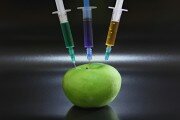Call To Ban BPA From Food Containers Is Ignored
Before I knew what a polyphenol was or what double-blind placebo-controlled really meant, I believed the words “clinically proven” meant something was effective and, more importantly, safe.
What can I say? The past 5 years have been an eye-opener.
These days, I find the words “clinically proven” more frightening than the warning on a pack of cigarettes… and the same goes for phrases like “too little to do any harm” or “reviewing evidence”…
For the logic behind that fear, you only need to look at the mainstream’s position on Bisphenol A (BPA), the toxin that lines most canned goods and many other food containers.
All evidence aside
Three years ago, a Journal of the American Medical Association (JAMA) study linked high BPA urinary levels to increased risk of heart disease and type 2 diabetes.
Then, in another JAMA study published last year, subjects who ate freshly made soup every day for five days had an average BPA level of 1.1 micrograms per litre of urine. Average BPA in subjects who ate soup from cans was an astounding 20.8 micrograms per litre!
Recently, the Natural Resources Defence Council petitioned the American Food and Drug Administration (FDA) to ban the use of BPA in any container where food makes contact with the chemical.
But instead of reviewing existing evidence, FDA scientists conducted their own BPA research. The final opinion from FDA researchers: Blood levels of BPA are too low to do any harm.
In short: Don’t worry your pretty little heads about daily BPA intake. Now run along!
However, here’s what alternative health expert Dr. Alan Spreen has to say: “The FDA loves to play those games where ‘it’s so little it doesn’t matter.’ So a little mercury is okay, though we don’t argue that it’s toxic. A little radioactivity is okay, though we don’t argue that it’s toxic. A little lead, fluoride, formaldehyde, cadmium, aluminium, etc., ad nauseum.
“What they always end up saying is, ‘Keep it below our totally arbitrary cut-off level that we just made up.'”
Meanwhile, two industries are celebrating.
The food industry is an obvious winner. Food producers won’t have to spend millions refashioning their canned goods.
But the truly big winner is the chemical industry.
Bloomberg News reports that BPA production profits run about $8 billion per year.
An FDA ban of BPA wouldn’t hurt you, me, or millions of other consumers. The ban would only hurt chemical industry giants and a few large food manufacturers.
As usual, “taking action” effectively means a half-hearted attempt at doing sweet nothing!
Did you find this information useful?
Then why not get more expert health recommendations just like this delivered direct to your inbox?
"It is truly refreshing to read a newsletter on the topic of alternative medicine which is scientifically based and reviewed by professionals..." - Robert Sinott
We respect your privacy and will never share your details with anyone else.Disclaimer: Bear in mind the material contained in this article is provided for information purposes only. We are not addressing anyone’s personal situation. Please consult with your own physician before acting on any recommendations contained herein.
Sources:
“Feds Reject Petition to Ban BPA in Food” John Hamilton, NPR, 3/30/12, npr.org
“BPA in Your Food? The FDA’s Still Okay With That” Tom Philpott, Mother Jones, 4/4/12, motherjones.com BPA in Your Food? The FDA’s Still Okay With That.
“Big Farma Once Again Walking All Over Your Safety-and the Constitution” The Alliance for Natural Health, 2/21/12, anh- usa.org
- Comments (1)
- Facebook Comments (0)
Comments are closed.











Greai article. I live out of cans and have often wondered if J am getting tiny bits of tin in my food from the opener!?